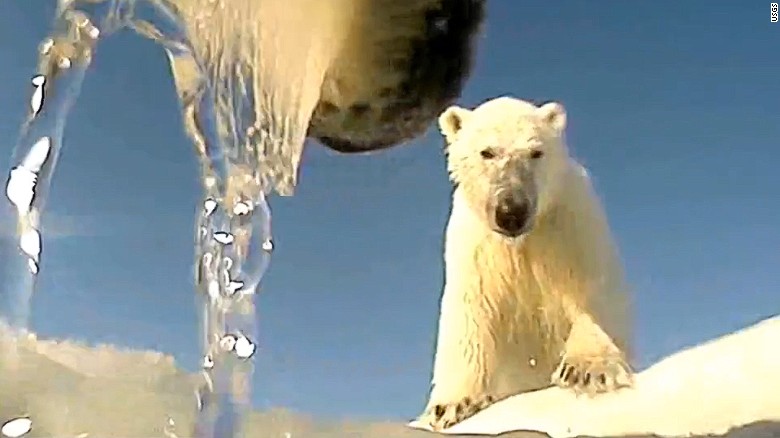Polar bears will struggle to survive if climate change continues, says report
 Rising global temperatures is the single most important threat to the polar bears, which rely on sea ice to catch prey, according to the US Fish and Wildlife Service report."Without significant reductions [in global temperatures] ... it is unlikely that polar bears will be recovered," the agency said -- meaning that the species will continue to be considered endangered.As a way for researchers to better understand how polar bears are coping with declines in Arctic sea ice, point of view cameras ..>> view original
Rising global temperatures is the single most important threat to the polar bears, which rely on sea ice to catch prey, according to the US Fish and Wildlife Service report."Without significant reductions [in global temperatures] ... it is unlikely that polar bears will be recovered," the agency said -- meaning that the species will continue to be considered endangered.As a way for researchers to better understand how polar bears are coping with declines in Arctic sea ice, point of view cameras ..>> view originalOdd Shadow Around Young Star May Be Sign of Newborn Planet
These images, taken a year apart by NASA's Hubble Space Telescope, reveal a shadow moving counterclockwise around a gas-and-dust disk encircling the young star TW Hydrae. The two images at the top show an uneven brightness across the disk. Through enhanced image processing (images at the bottom), the darkening becomes even more apparent. Credit: NASA, ESA and J. Debes (STScl) Astronomers might have just found a new way to discover alien planets. A bizarre shadow cast on the disk of d..>> view originalUltra-light "super-material" is ten times stronger than steel
A spongy new super-material could be lighter than the flimsiest plastic yet 10 times stronger than steel.The new super-material is made up of flecks of graphene squished and fused together into a vast, cobwebby network. The fluffy structure, which looks a bit like a psychedelic sea creature, is almost completely hollow; its density is just 5 percent that of ordinary graphene, the researchers said.What’s more, though the researchers used graphene, the seemingly magical properties of the material ..>> view originalAntarctica is about to lose an enormous piece of ice. The question is what happens after that.
The Larsen C rift on Nov. 10. (John Sonntag/NASA) Last week, British scientists announced a disturbing finding — a crack in the Larsen C ice shelf in the Antarctic Peninsula had dramatically accelerated its spread, increasing 11 miles in length in the space of a month. This means the floating ice shelf, which is nearly as big as Scotland and the fourth largest of its kind in Antarctica, is poised to break off a piece nearly 2,000 square miles in size, or over 10 percent of its total area. An..>> view originalAn asteroid had a semi-close encounter with Earth
NASA/EPA/File A view of Earth from space. A previously undetected asteroid that could rival the size of a mid-sized Boston office building passed by Earth this week in a close shave that brought the object within half the distance of the moon. The space rock — with the catchy name 2017 AG13 — was likely somewhere between 36 feet and 115 feet across, a relatively small size that makes asteroids difficult to detect when they are far away from Earth but could be very dangerous if they broke ..>> view originalOh deer: monkey caught in flagrante delict-doe
Scientists on Tuesday revealed the "highly unusual" behaviour of a male monkey filmed trying to have sex with female deer in Japan—a rare case of inter-species nookie. Sex between animals from different species is uncommon, but exceptional cases are ...>> view originalBumblebee is first bee in continental US to be listed as endangered
The rusty patched bumblebee is in worrisome decline and it is a race to keep it from becoming extinct, the agency said. "Listing the bee as endangered will help us mobilize partners and focus resources on finding ways right now to stop the decline," Wildlife Service Midwest Regional Director Tom Melius said.The population of the rusty patched bumblebee has shrunk by 87% since the late 1990s, the wildlife service said. Bees help pollinate 35% of the world's food, and bumblebees pollinate everyth..>> view originalStudy suggests Earth once had many moonlets — until they merged to form the moon
This narrow-angle image taken by NASA's Cassini shows the moon in August 1999. (NASA/JPL/Space Science Institute) The moon is the most obvious and familiar object in Earth's night sky — constant, consistent, predictable in its monthly cycles and its daily rising and setting. Astronomers understand the moon's movements so thoroughly that even a break from the routine, like an eclipse, can be anticipated 1,000 years in advance. But we don't know the moon as well as we think. In fact, for years..>> view originalSpying on Our Stellar Neighbors: New Strides Made in Alpha Centauri Planet Hunt
GRAPEVINE, Texas — Earth's lonely sun is an outlier: most of the nearest sun-like stars have a stellar buddy or two in orbit with them. And researchers are getting closer to probing those complicated systems to directly image their planets. At last winter's meeting of the American Astronomical Society (AAS), Space.com reported on a talk by Ruslan Belikov, a scientist at NASA's Ames Research Center in California, about how to complete a seemingly impossible task: using a deformable mirror ..>> view original
Wednesday, March 8, 2017
Polar bears will struggle to survive if climate change continues, says report and other top stories.
Subscribe to:
Post Comments (Atom)
No comments:
Post a Comment